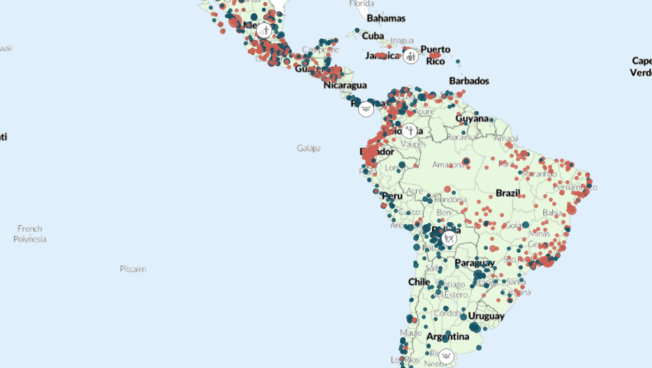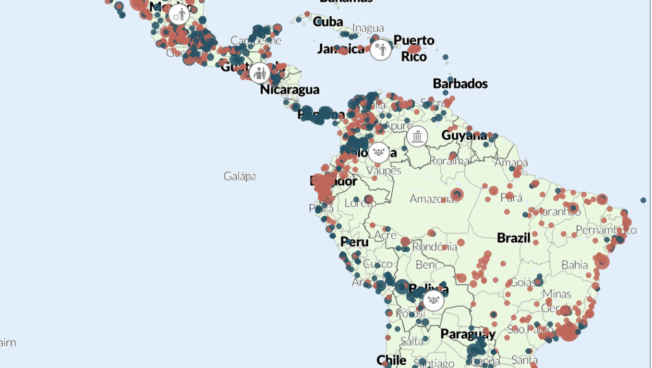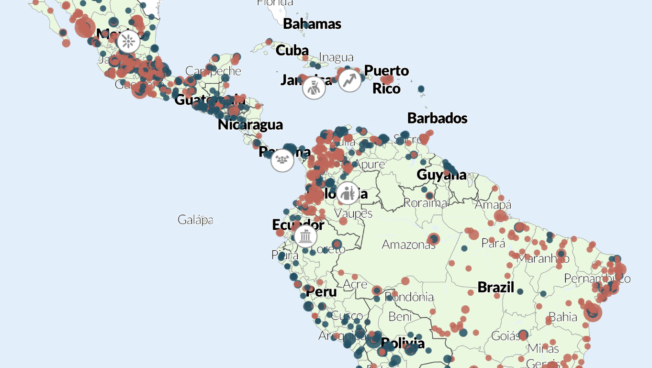Regional Overview
Latin America and the Caribbean
August 2024
Posted: 6 September 2024
In this Regional Overview
- Brazil: Violence erupts over land disputes in Mato Grosso do Sul
- Colombia: Hostilities between the ELN and state forces resume as ceasefire ends
- Haiti: Police forces take on the Viv Ansanm gang alliance in Port-au-Prince
- Jamaica: Violence grows deadlier in Clarendon and Saint Catherine parish with gang-related mass shootings
- Mexico: Security operations against the Sinaloa cartel intensify amid rising intra-cartel tensions
- Venezuela: Supreme Court ratifies Maduro’s disputed re-election amid national and international protests
Brazil: Violence erupts over land disputes in Mato Grosso do Sul
On 3 and 4 August, armed men supported by farmers in trucks and tractors attacked Guarani-Kaiowá Indigenous people reclaiming land in Douradina, Mato Grosso do Sul, injuring at least 11 people.1Gabriela Moncau, ‘Fazendeiros fazem dois ataques armados e ferem 11 indígenas no MS: ‘com certeza vai acontecer mais’, alerta liderança,’ Brasil de Fato, 5 August 2024 The Guarani-Kaiowá are reclaiming ancestral land in the Panambi-Lagoa Rica territory, preliminarily demarcated in 2011 by the National Indigenous Foundation.2José Câmara, ‘O que se sabe sobre o conflito agrário entre fazendeiros e indígenas que deixou 11 feridos em MS,’ 6 August 2024 Farmers, on the other hand, are pushing for the recognition of the area as private property.3Gabriela Moncau, ‘Ruralistas fizeram evento ’em defesa da propriedade’ no dia e cidade em que indígenas e cineastas foram espancados no MS,’ Brasil de Fato, 15 December 2023 The attack is the latest episode of violence in recurring tensions between Indigenous people and farm owners in Brazil and occurred two days before discussions between Supreme Court justices and lawmakers on a law proposed by right-wing deputies and approved by Congress in 2023. The law, which limits Indigenous land claims to lands they occupied before 1988,4André Richter, ‘STF faz primeira audiência de conciliação sobre marco temporal,’ Agência Brasil, 5 August 2024; Constance Malleret, ‘Controversial Brazil law curbing Indigenous rights comes into force,’ The Guardian, 28 December 2023 sparked widespread unrest in 2023. The Ministry of Indigenous Affairs emphasized that the ongoing instability surrounding land claims not only creates legal uncertainty for Indigenous peoples but also leads to cases of violence in which they are often the main victims.5Government of Brazil, ‘Nota sobre ataque a indígenas Guarani Kaiowá em Mato Grosso do Sul,’ 4 August 2024 On 28 August, the Articulation of Indigenous Peoples of Brazil decided to withdraw from the conciliation table set up by the Supreme Court to discuss the above-mentioned law, arguing the process is unconstitutional and reproduces institutional racism.6Joao Gabriel, ‘Indígenas criticam conciliação sobre marco temporal no STF e devem abandonar negociação,’ Folha de Sao Paulo, 28 August 2024
Colombia: Hostilities between the ELN and state forces resume as ceasefire ends
On 3 August, the one-year ceasefire between the government and the National Liberation Army (ELN) ended.7Brian Ferney Valencia Ríos, ‘Finalizó el cese al fuego con el ELN y no hubo prórroga, ¿diálogos de paz en veremos?,’ El Colombiano, 4 August 2024 The ELN conditioned the extension of the agreement on the government removing the group from its list of organized armed groups before 23 August, which the government declined.8Camilo Castillo, ‘Eln afirma que el Gobierno ‘sigue regateando’ acuerdos tras no sacarlos de lista de grupos armados organizados,’ El Tiempo, 26 August 2024 Peace negotiations had already been frozen since February after the government started peace talks with the ELN splinter group Comuneros del Sur in Nariño, and the ELN failed to comply with their commitment to stop kidnapping civilians.9Julián Ríos Monroy, ‘El detrás de crisis que llevó al fin del cese al fuego con ELN: ¿hora de replantear?,’ El Espectador, 4 August 2024 During the year-long ceasefire, violent interactions between the ELN and state forces dropped, with at least 10 incidents recorded between August 2023 and July 2024, more than six times less compared to the previous year. The end of the agreement triggered a resumption of hostilities in areas with a strong ELN presence during the last week of August. At least three soldiers and four rebels were killed in five clashes between ELN and state security forces in Cauca and Norte de Santander. In Arauca, the rebel group also carried out five attacks with explosives against oil infrastructure, resuming a common tactic that had significantly reduced during the ceasefire, during which ACLED records only one such event.
Haiti: Police forces take on the Viv Ansanm gang alliance in Port-au-Prince
Between 27 and 28 August, police officers, supported by Kenyan officers of the Multinational Security Support Mission (MSS), launched raids in Bel-Air, Delmas 2, and Solino neighborhoods. Security forces claimed the operations resulted in the killing of more than 18 gang members allegedly affiliated with the Viv Ansanm coalition and three officers being injured, although local activists suggest the toll is much lower.10Rezo Nodwes, ‘Bel-Air, Solino : seulement deux clochards abattus dans des opérations mascarades, selon Marc-André Alexandre,’ 1 September 2024 These operations came in response to attacks carried out by gangsters in the Solino neighborhood and nearby areas of the southern part of Delmas commune. According to local sources, gangs involved in these attacks were seeking to strengthen their control around the center of Port-au-Prince and areas connecting to the international airport.11Metropole, ‘Nouvel assaut des gangs contre le quartier stratégique de Solino,’ 16 August 2024 Following the attacks, residents barricaded roads to demand action against insecurity.
Meanwhile, on 17 August, authorities extended the state of emergency imposed on 16 July in 14 communes in the Ouest and Artibonite departments to re-establish public order, extending the measure to the Centre, Nippes, and two arrondissements of the Nord departments.12Alter Press, ‘Haïti-Criminalité : L’état d’urgence sécuritaire prolongé et étendu jusqu’au 19 septembre 2024 dans 4 départements géographiques,’ 20 August 2024 Since the first MSS contingents were deployed, clashes between state forces and gangs have persisted at similar levels, focused on areas like Gressier and Ganthier in the periphery of Port-au-Prince, where gangs have tested police response by seizing police stations. However, civil society organizations indicate that the MSS deployment has not led to gang retreats or significant territorial gains.13RFI, ‘Haiti gangs ‘aren’t even worried’ by Kenyan police,’ 29 August 2024
Jamaica: Violence grows deadlier in Clarendon and Saint Catherine parish with gang-related mass shootings
In Clarendon and Saint Catherine, gang rivalries grew deadlier in August as a result of two massive shootings that resulted in several fatalities. In Clarendon parish, eight people were killed in an attack perpetrated by suspected gang members, including one in which gangsters shot indiscriminately at over 50 people during a party on 11 August. Meanwhile, in Saint Catherine, armed men shot at a group of people during a wake on 21 August, leaving one dead and seven others injured. Following the attacks, authorities imposed separate curfews in each parish. Prime Minister Andrew Holness claimed that anti-gang actions would be reinforced and committed to carrying out investigations to bring gangsters to justice.14The Office of the Prime Minister, ‘Press Conference on Brutal Murders in Cherry Tree Lane, Clarendon,’ 12 August 2024 The incident in Clarendon contributed to the increase in violence in this parish in 2024, during which at least 20 violent incidents have taken place, already outnumbering violence levels recorded for the entire 2023. While country-wide levels of violence appear to be subsiding slightly, violent killing sprees break out continually between gangs fighting for the control of extortion rackets and trafficking of illicit goods, increasingly so in the Clarendon parish.
Mexico: Security operations against the Sinaloa cartel intensify amid rising intra-cartel tensions
Following the arrest of Joaquín Guzmán López and Ismael Zambada, known as El Mayo, in the US, targeted attacks against members of the different factions of the Sinaloa cartel started taking place in the northern state of Sinaloa, where there has also been an increase in raids by security forces. While overall levels of violence have not spiked, at least eight people were killed in four separate attacks between 14 and 17 August, in a series of incidents that are likely related to the fight between the El Mayo faction and the faction led by Los Chapitos — sons of the arrested leader known as El Chapo.15Associated Press, ‘Sinaloa cartel infighting rises in northern Mexico following the detention of 2 drug lords in July,’ 20 August 2024 These attacks included the killing of a collaborator of El Mayo, who led the fentanyl trade in Sinaloa, along with two other men, in Elota municipality around 17 August.
Against the backdrop of these worsening internal tensions, Mexican authorities stepped up operations against the Sinaloa cartel. Around 3 August, the military killed at least nine suspected members of the Sinaloa cartel in a clash in La Loma village, which is known for being a demarcation between the areas controlled by the two abovementioned cartel factions.16Victoria Dittmar and Mike LaSusa, ‘Guerra fría en el Cartel de Sinaloa tras la captura de El Mayo,’ InSight Crime, 20 August 2024 On 29 August, during another raid supposedly aimed at capturing a close collaborator of the Chapitos faction in Culiacán, armed men attacked security forces and set up roadblocks.17Al Jazeera, ‘Mexico’s military attacked, roads blocked in drug cartel stronghold Sinaloa,’ 30 August 2024 In August, ACLED records the highest number of armed clashes between armed groups and security forces in Sinaloa since January 2023. The Sinaloa Cartel was involved in almost half of these clashes.
Venezuela: Supreme Court ratifies Maduro’s disputed re-election amid national and international protests
A month after the National Electoral Council declared President Nicolás Maduro the winner of the 28 July presidential election, opposition-led demonstrations condemning alleged fraud and demanding the disclosure of voting records continue in the country.18Florantonia Singer, ‘La oposición venezolana busca una movilización mundial en las calles para intensificar la presión sobre Maduro,’ El País, 17 August 2024 An initial outbreak of widespread unrest in late July was met with deadly repression by security forces and pro-government militias known as colectivos, leading to the detention of at least 2,400 people and the death of at least 22 protesters. In August, the number of anti-government demonstration events increased, with about 150 recorded events, the third-highest monthly total since 2018. In addition, around 220 protests have been reported outside of Venezuela to repudiate the election results since 28 July.19France 24, ‘“Fue fraude”: miles protestan dentro y fuera de Venezuela contra la reelección de Maduro,’ 17 August 2024 However, the opposition’s capacity to mobilize protesters seems to have subsided since the Supreme Court of Justice ratified Maduro’s victory on 22 August.20BBC News Mundo, ‘Cómo funciona el Tribunal Supremo de Venezuela y por qué se duda de su imparcialidad,’ 22 August 2024 ACLED records only 24 anti-government demonstrations on 28 August — one-third of those recorded on 17 August. In both cases, the opposition called for mass mobilizations, the former on the occasion of the first month since the election and the latter to increase street pressure ahead of the expected Supreme Court ruling.
See More
See the Codebook and the User Guide for an overview of ACLED’s core methodology. For additional documentation, check the Knowledge Base. Region-specific methodology briefs can be accessed below.
Links:







